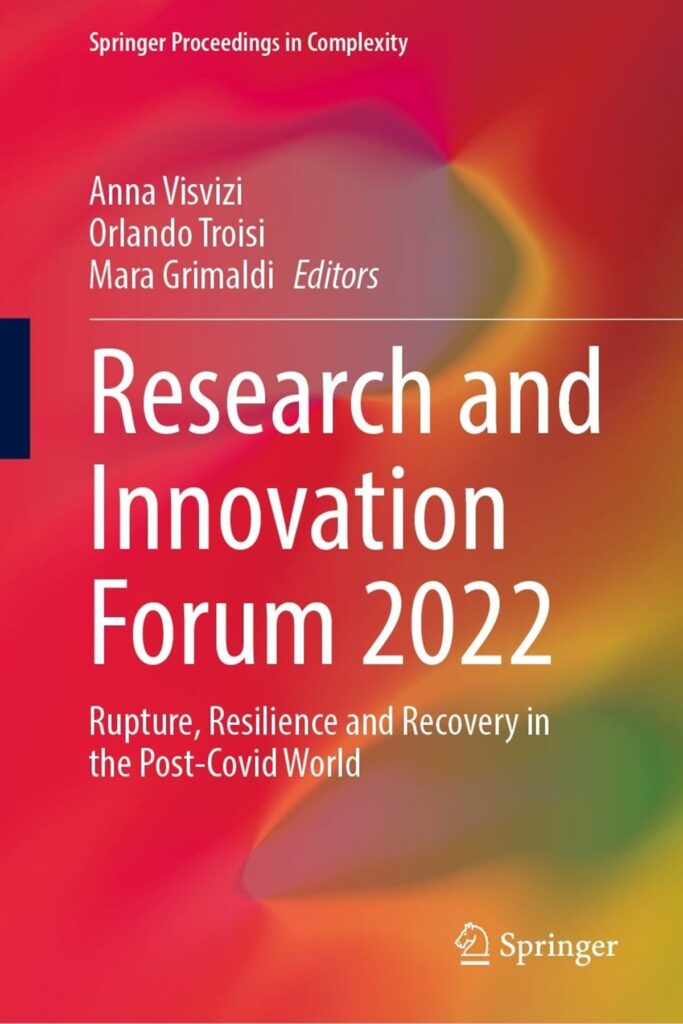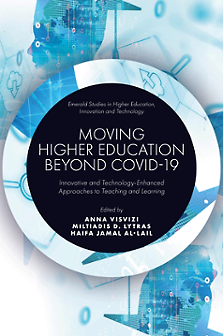This research on online teaching and online negotiation was made during the COVID-19 pandemic.
It consists of the following book chapter and chapter of a Conference proceeding:
Pauletto, Christian (2023). “Online teaching in HEIs vs. online international negotiation: analogies and transferable good practices”. Chapter 3 in: Visvizi, Anna; Lytras, Miltiadis D. & Jamal Al-Lail, Haifa (eds.), Moving Higher Education Beyond Covid-19: Innovative and technology-enhanced approaches to teaching and learning. Bingley: Emerald Publishing, pp. 29-51. ISBN 978-1-80382-518-2.
Pauletto, Christian (2023). “Addressing the Digital Divide in Online Education: Lessons to Be Drawn from Online Negotiation”. In: Visvizi, Anna, Troisi, Orlando & Grimaldi, Mara (eds.), Research and Innovation Forum (Rii Forum) 2022: Rupture, Resilience and Recovery in the Post-Covid World, Springer Proceedings in Complexity (SPCOM). Cham: Springer, pp. 395–403. DOI:10.1007/978-3-031-19560-0_31, ISBN: 978-3-031-19559-4.
While both articles cover the same research, the Conference proceeding is more focussed on the question of how to overcome the digital divide, whereas the book chapter is more contextualized and comprehensive. The two bibliographies overlap, but the bibliography contained in the book chapter is more general.
The two respective abstracts are reproduced below:
ABSTRACT
“Online teaching in HEIs vs. online international negotiation: analogies and transferable good practices”, Emerald
The concept of innovation should not be reduced to its technological dimension but encompasses the whole context of its deployment and implementation. Regardless of technology, an innovation may be successful or not depending on how well its implementation suits each single context. In the case of education, this consists, to a sizeable extent, in a communicational and interpersonal context. The hypothesis of this piece is that maintaining optimal communication between participants is a key factor of success of new online teaching methods. Given that in this regard, there are similarities between negotiating practice and teaching practice, it is worth examining whether good practices developed in online international negotiation are transferable to online teaching. The chapter identifies a number of practices from online negotiation that perform well in online teaching. It focuses on communicational aspects, mutual understanding (monitoring and optimization of understanding), motivation to listen, attention, active participation, and non-verbal communication. Online teaching and online negotiation share another common feature: some unresolved challenges are common to both disciplines. This should also be taken into account when migrating educational programmes online. The research is informed by the author’s first-hand experience from practice in both international diplomatic negotiation and academic teaching.
ABSTRACT
“Addressing the Digital Divide in Online Education: Lessons to Be Drawn from Online Negotiation”, Springer
During the Covid-19 pandemic, the digital divide was often identified as an obstacle to online teaching, and inequalities in education were sometimes observed. This challenge could be addressed by making online teaching more efficient through the application of good practices. Given that there are similarities between diplomatic negotiating practice and teaching practice, it is worth examining whether good practices developed in online diplomatic negotiation are transferable to online teaching. The aim of this paper is to examine good practices in online negotiation and explore how such good online practices could be transferred to teaching. The research is informed by the author’s first-hand experience from practice in both international diplomatic negotiation and academic teaching. The paper identifies a number of practices from online negotiation that are equally effective in online teaching. It focuses on communicational aspects, mutual understanding (monitoring and optimisation of understanding), motivation to listen, attention, active participation, and non-verbal communication. Some unresolved challenges of online teaching remain though, which are not addressed in this paper.


Dernière mise à jour : 11 juin 2024, Pauletto, Christian
Updated on: 11 June 2024, Pauletto, Christian
. . .
Dernière mise à jour : 11 juin 2024, Pauletto, Christian
Updated on: 11 June 2024, Pauletto, Christian
. . .